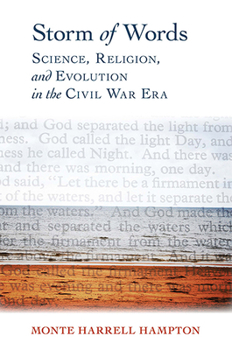Storm of Words: Science, Religion, and Evolution in the Civil War Era
(Part of the Religion and American Culture Series)
Storm of Words is a study of the ways that southern Presbyterians in the wake of the Civil War contended with a host of cultural and theological questions, chief among them developments in natural history and evolution. Southern Presbyterian theologians enjoyed a prominent position in antebellum southern culture. Respected for both their erudition and elite constituency, these theologians identified the southern society as representing a divine, Biblically ordained order. Beginning in the 1840s, however, this facile identification became more difficult to maintain, colliding first with antislavery polemics, then with Confederate defeat and reconstruction, and later with women's rights, philosophical empiricism, literary criticisms of the Bible, and that most salient symbol of modernity, natural science. As Monte Harrell Hampton shows in Storm of Words, modern science seemed most explicitly to express the rationalistic spirit of the age and threaten the Protestant conviction that science was the faithful "handmaid" of theology. Southern Presbyterians disposed of some of these threats with ease. Contemporary geology, however, posed thornier problems. Ambivalence over how to respond to geology led to the establishment in 1859 of the Perkins Professorship of Natural Science in Connexion with Revealed Religion at the seminary in Columbia, South Carolina. Installing scientist-theologian James Woodrow in this position, southern Presbyterians expected him to defend their positions. Within twenty-five years, however, their anointed expert held that evolution did not contradict scripture. Indeed, he declared that it was in fact God's method of creating. The resulting debate was the first extended evolution controversy in American history. It drove a wedge between those tolerant of new exegetical and scientific developments and the majority who opposed such openness. Hampton argues that Woodrow believed he was shoring up the alliance between science and scripture--that a circumscribed form of evolution did no violence to scriptural infallibility. The traditionalists' view, however, remained interwoven with their identity as defenders of the Lost Cause and guardians of southern culture. The ensuing debate triggered Woodrow's dismissal. It also capped a modernity crisis experienced by an influential group of southern intellectuals who were grappling with the nature of knowledge, both scientific and religious, and its relationship to culture--a culture attempting to define itself in the shadow of the Civil War and Reconstruction.
Format:Hardcover
Language:English
ISBN:0817318313
ISBN13:9780817318314
Release Date:July 2014
Publisher:University Alabama Press
Length:360 Pages
Weight:1.55 lbs.
Dimensions:1.3" x 6.2" x 9.1"
Customer Reviews
0 rating





